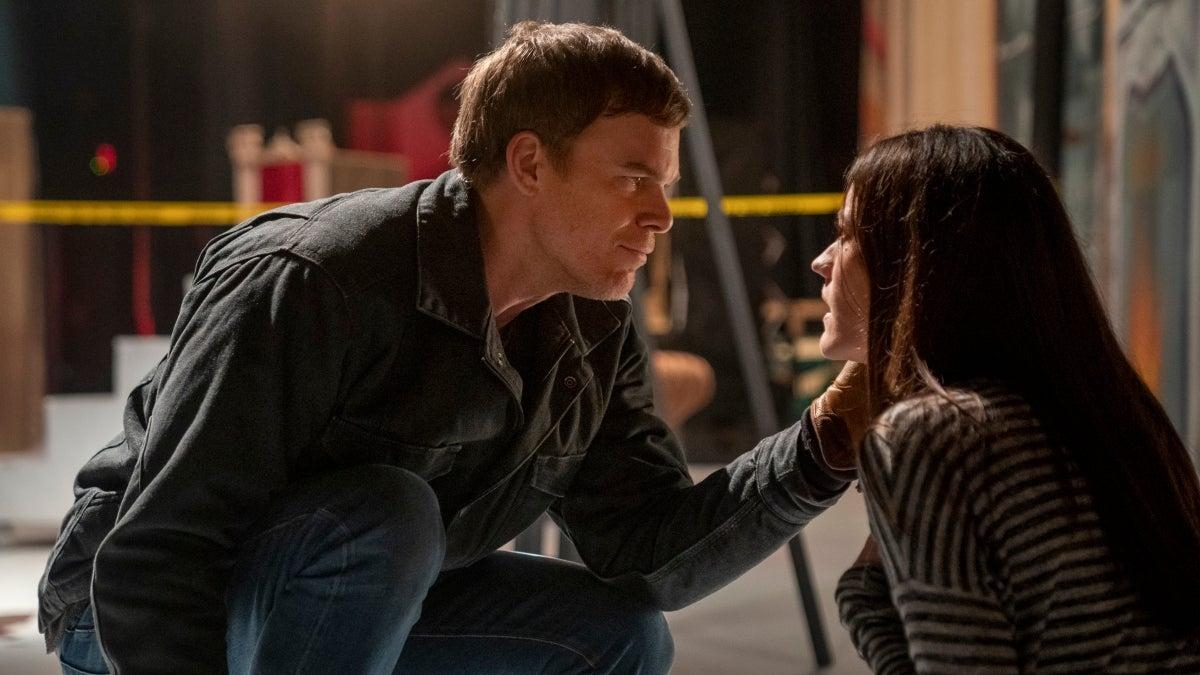The cat’s in the cradle and Dexter’s a proud papa in a strong New Blood
The fourth episode of the revival, "H Is For Hero," homes in on Dexter's most potent themes.


When attempting to analyze a serial killer, all roads lead back to the old question of nature versus nurture. Are monsters born or are they made? In the case of Dexter Morgan, it’s a little of both. Something changed in Dexter very early on in his life, back when he was a wailing infant all alone in a shipping container as his mother bled out next to him. Harry imbued Dexter with a sense of purpose, and by the end of the first season, Dexter was all too clear on the disturbing direction his life might have taken if not for Harry’s code.
The etiology of a sophisticated monster like Dexter provided the original series with its most intriguing themes, which is why those themes were so thoroughly explored in the first season. Given his choice of siblings, Dexter chose Deb over Brian Moser, convinced that taking the road less traveled by would make all the difference. In slitting his own brother’s throat, Dexter eliminated the only other person who understood what he went through in that shipping container, how it felt to be hungry, wet, and cold and see red in every direction. He thought that no one in his life would ever again understand what that felt like.
At last, Dexter is again in the presence of someone who understands that uniquely traumatic experience now that the father presumed dead is reunited with the son presumed Argentinian. (Sure, it was probably more hospitable in the Morgans’ master bathroom than in that shipping container, but let’s not get started on how much easier the kids of today have it.) The reintroduction of Harrison puts New Blood in a position the Dexter franchise hasn’t been in since the first season. It’s perfectly set up to explore the central theme of whether a monster, with proper care and feeding, can be assimilated into society and at what cost.
By leaning into those ideas, “H Is For Hero” instantly becomes more interesting and more poignant than the episodes leading up to it. The episode’s central mystery grows out of what initially looked to be New Blood’s goofiest storyline. Dexter is alerted to a lockdown at Harrison’s high school, then finds out from Angela that there’s been a violent incident and Harrison’s involved. He arrives to find a bloody scene that instantly feels suspicious to him. In the auditorium, Harrison’s being treated for a slash wound to his abdomen. But most of the blood belongs to Ethan, who according to Harrison, attacked him after Harrison refused to join in his school shooting plan.
Dexter explores his suspicions by going back to his roots in crime scene investigation, but why? Especially when the tidy narrative Harrison provides is so palatable to everyone in Iron Lake. There’s no cost to believing, as the rest of the town does, that Ethan was planning an imminent attack on Iron Lake High School and targeting a list of cool kids that just so happens to include Angela’s daughter. But Ghost Debra has a theory: Dexter is hoping and praying Harrison has taken on his father’s dark urges. Harrison’s story makes him an unambiguous hero, but Dexter can’t relate to an unambiguous hero. There has to be another explanation.
After skulking around the crime scene as only he can, Dexter pieces together the truth. Harrison was the aggressor in the incident with Ethan, and his wound was self-inflicted. In the final frame of the episode, Dexter’s face curls into a satisfied smile as he realizes his son takes after him in the best version of the worst way. Dexter’s reaction is really fascinating considering how little he actually knows about Harrison or the rationale for his actions. On the surface, Harrison went to extreme ends to stop a potential mass murderer from realizing his destructive goals. It’s exactly what Dexter would have done, and it’s his perfect example of the good that can result when Harry’s code is applied. But Dexter’s a fool if he doesn’t share Ghost Deb’s concern that Harrison shares a weapon of choice with the Trinity Killer.
Speaking of Trinity, Harrison gets a moment to reflect on his formative trauma in an episodic arc that suggests he views his dark passenger as a curse rather than a gift. It’s conceivable that someday Harrison might learn to appreciate his knack for ferreting out murderers and mitigating the damage they can cause, much as Dexter did when he invented his “Dark Defender” alter ego. But for now, it’s a bummer, in part because Ethan is to Harrison as Brian Moser was to Dexter. Harrison is the more sophisticated and scrupulous version of Ethan—he’d never leave a notebook of crude murder drawings for someone to find—but he’s a brooding misfit who understands the urge to neutralize the bullies.
There’s a right and wrong way to indulge that urge, and in Harrison’s mind, Ethan went too far across the line. An intimidating chokehold is one thing, but that notebook established motive and intent, and he had the means thanks to his dad’s cache of weapons from Fred’s Fish and Game. Any day could have been the day when Ethan decided he had the right opportunity to combine all the other elements of his would-be crime spree. Harrison, as far as we know, couldn’t let that happen, so he took on the burden of preventing it. And what a burden it is, especially when Harrison comes to check on his victim and finds Ethan’s parents struggling to find the silver lining around Harrison’s proactive solution to the Ethan problem.
And so, like his father before him, Harrison has made the righteous choice even though it’s the one destined to leave him lonely, and it wasn’t easy for him. He seems to have somehow absorbed the same code that had to be manually drilled into Dexter as a child. With Dexter’s tutelage, he could be the greatest serial killer that ever was. You can’t blame a guy for getting overly excited about his child’s potential.
Stray observations
- The season’s villain has finally been confirmed to be Kurt Caldwell, who is revealed to be the proprietor of The Fillin’ Station, Iron Lake’s fuel cafe, as well as The Killin’ Station, Iron Lake’s least reviewed Airbnb. I’m not even sorry for that pun, further proof that sociopaths walk among us.
- Caldwell is still claiming to have FaceTimed with Matt and is avoiding Angela at all costs. Is it because, as Ghost Deb theorizes, he’s trying to take revenge on whoever he thinks Matt’s killer is?
- Angela seems like she’ll be less interested in the Caldwell mystery for a while now that she’s reluctantly teamed up with Molly Park to track down the many girls to go missing in the area.
- Harrison didn’t look like he was learning brand new information when he listened to Molly’s podcast episode about the Trinity Killer. He looked like he was sucking air through a cavity to see if it still hurts. (It does.)
- “He even eats like me,” says Dexter as Harrison eats like a starved wolf, just as Dexter tore up that ham steak in the original opening credit sequence.
- Molly refers to Angela’s photo wall of missing girls as her “Carrie wall,” presumably a reference to another Showtime series that overstayed its welcome and will inevitably be rebooted.